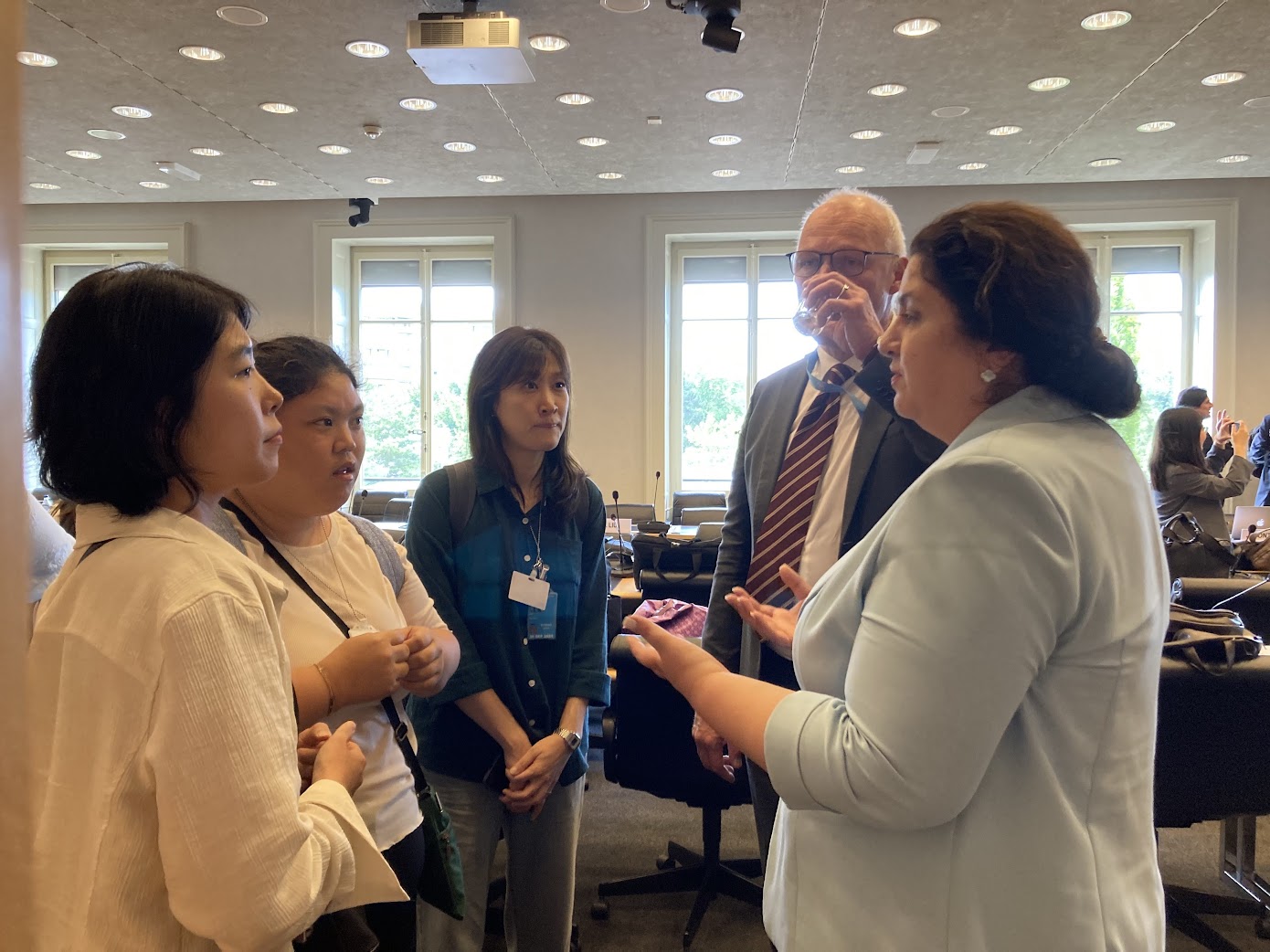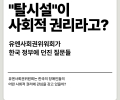1. On the night of the martial law, there were disabled people
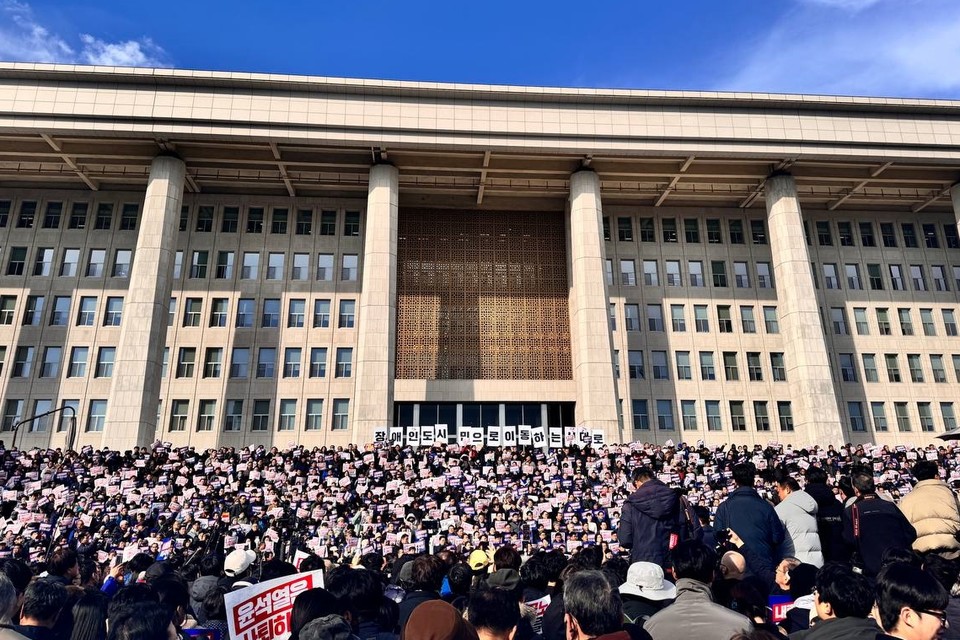
Photo: On 4th of December 2024, a day after President Yoon Suk-Yeol declared martial law but only to be invaded in 2 hours, people are gathering in front of the National Assemblyy. SADD activists hold up a banner in the back row that reads, ‘Towards the era of true citizenship for disabled people.’ (c) SADD
On 3rd December 2024, the President of South Korea, Yoon Seok-yeol, declared martial law out of the blue. This made citizens absurd, but they ran to the National Assembly to block the martial law. It’s already a famous story. But, did you know that there were disabled people, even before the citizens came?
The Solidarity Against Disability Discrimination and other radical disability rights organisations in Korea launch a 2-day demonstration every International Day of Persons with Disabilities. The demonstration starts on the 3rd of December and the participants stay over in front of the National Assembly, demanding laws and budget for disability rights.
This year, this annual demonstration faced an extraordinary challenge. The order prohibited political activities which directly endangered the demonstration on the second day by the disabled people’s organisations(DPOs). However, they did not disperse their assembly and defended their place.
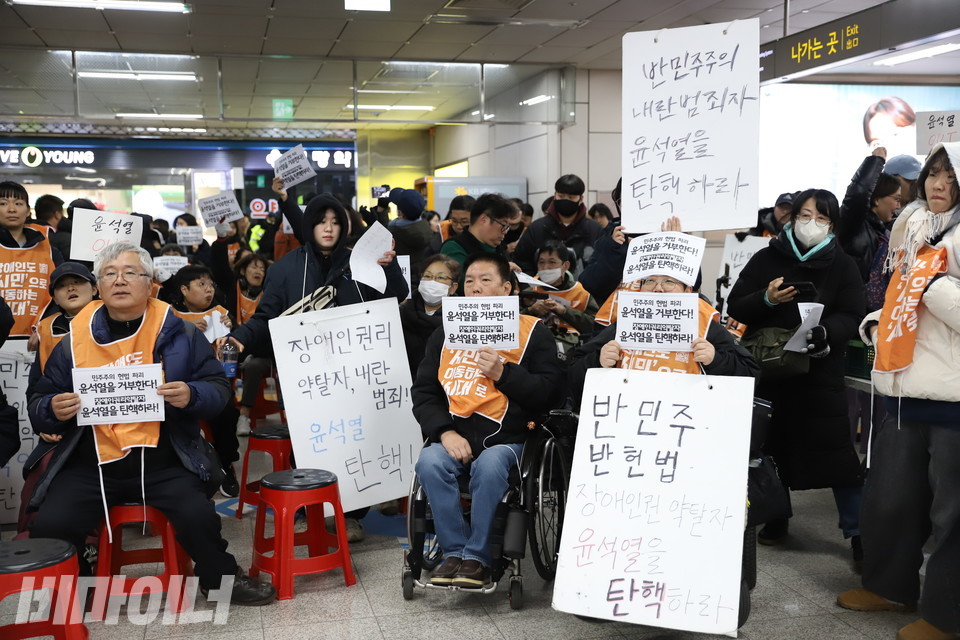
Photo: On 4th of December 2024, the SADD's International Disability Day campaign participants are gathered for a media conference, demanding impeachment of the president Yoon in the National Assembly Subway Station. (c) Beminor
It was not the first time that the DPOs had taken part in turmoil democratic scenes. In the last impeachment of then-president Park Geun-hye in 2017, DPOs had already been at the Gwanghwamun subway station, the main protest place for demanding impeachment, for more than five years. Five years of sit-in camp for demanding a system for disability justice.
These episodes shows the power of disabled people, the power of their relentless fight. Now, DPOs are participating in the protests for impeachment against Yoon. “True Democracy is a justice for all”, says SADDD. “Let’s make new era for the disabled to move as citizens!”.
2. Seoul Metropolitan City abolished its ordinance for deinstitutionalisation
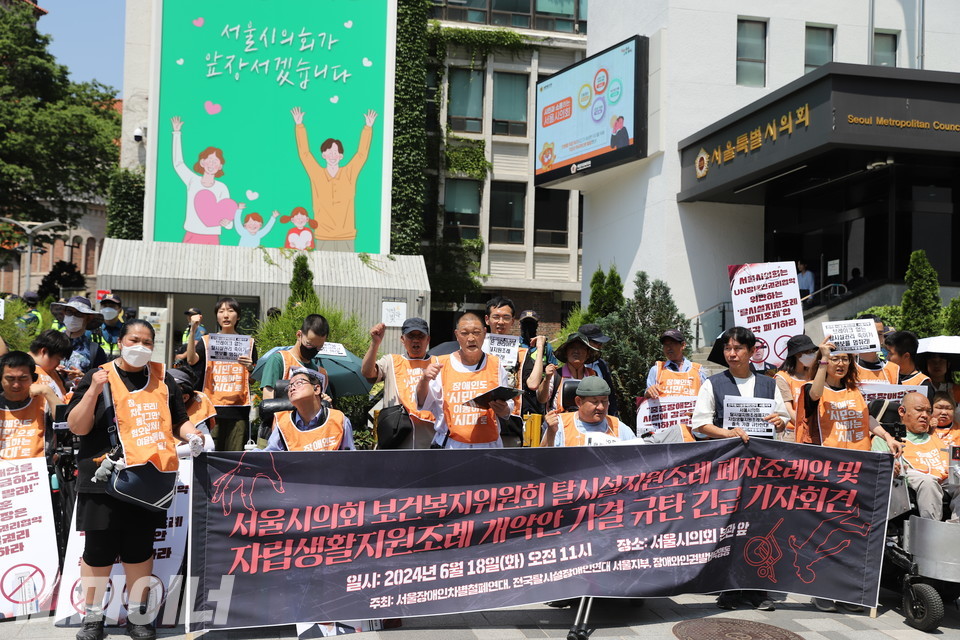
Photo: Deinstitutionalisation activists and survivors are holding a media conference in front of the Seoul Metropolitan Council, criticising the abolition of DI supporting ordinance. (c)Beminor
The Seoul Ordinance for Deinstitutionalization support was abolished even after the statement issued by the UN Committee on the Rights of Persons with Disabilities. On 17th June, the Seoul Metropolitan Council where the majority of its members are from the conservative ruling People Power Party, passed the “Bill to abolish the ordinance for deinstitutionalisation support”. Disabled Persons’ Organisations (DPOs) including the National Coalition of Survivors with Disabilities of Institutionalisation strongly condemned the bill. Furthermore, on 21st June 2024, the UN CRPD Committee issued a statement worrying about the attempt by the Council and emphasising the obligations of local governments to implement the UN CRPD. However, the Seoul Council eventually passed the abolition bill on 25th June 2024.
During the procedure, the council members made strong hate speeches against the persons with disabilities. Moon Seong-ho, a Council member, raises doubt about the letter from an activist of deinstitutionalisation demanding Seoul Council not pass the bill, saying that “the persons with learning disabilities cannot think of this(deinstitutionalisation) by themselves. This person must have been brainwashed by the DPOs”. Another Council member Yoo Man-hee, said during the official council meeting that “there is no such a word ‘Deinstitutionalisation’ in the UN CRPD”. He insisted that the council shall replace the word ‘deinstitutionalisation’ with ‘supporting independent living’. However, though it seems plausible, it is criticised for being a mere excuse to veil the true intention of eradicating the term ‘deinstitutionalisation’ since the anti-deinstitutionalisation groups are arguing that small group homes are also a form of independent living.
Though the abolition bill has been passed, Korean DPOs will not stop fighting against institutionalisation. We consider this challenge as a chance to hop further. Please keep watching what our fight will achieve in the future!
3. Amnesty International's letter-writing campaign included a Korean disability rights activist this year
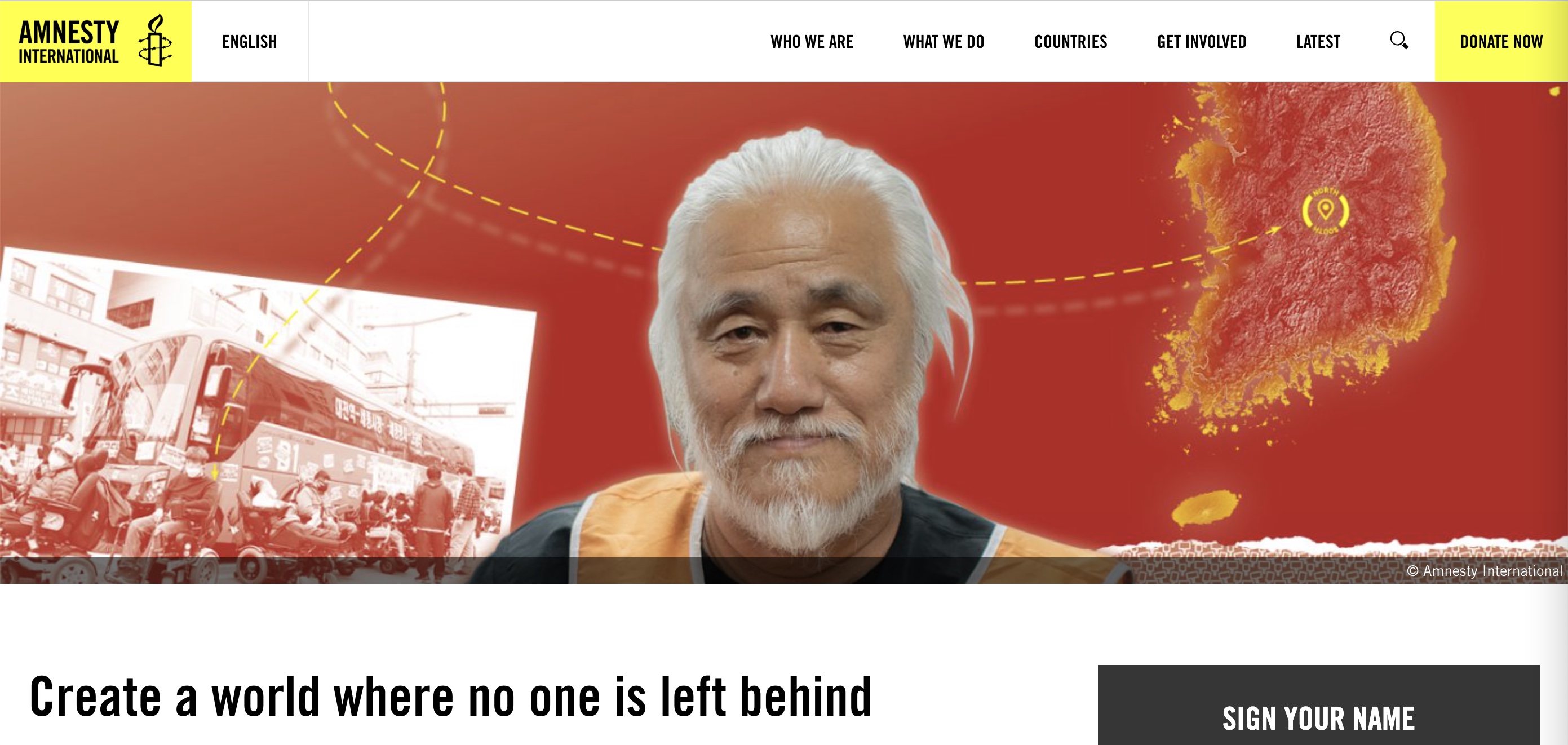
Photo: Amnesty International's letter-writing campaign page of Kyung-Seok Park case. (c)Amnesty International
Amnesty International, one of the biggest international human rights organisations, included Kyungseok Park, an activist of the Solidarity Against Disability Discrimination(SADD) in their letter-writing campaign 2024.
Amnesty International explained the reason as below;
“Alongside fellow activists from SADD, Kyung Seok took part in peaceful protests during commuter hours, demanding an increase to the public budget for the rights of people with disabilities.
Authorities reacted with unlawful force, including by dragging peaceful protesters out of trains and stations. Seoul Metro also filed multiple punitive lawsuits against them, portraying activists as a public nuisance. In January 2024, 400 people with disabilities lost their jobs after the Seoul metropolitan government cut all funding for a programme that allowed agencies to hire them.
Kyung Seok himself was strangled by the police and a Seoul Metro employee during a protest. Despite facing abuses, multiple lawsuits and smear campaigns, Kyung Seok continues to fight.”
Do you want to join the campaign? Visit and write!
4. The UN Committee Against Torture recommended Korean government redress the survivors of institutionalisation
The UN CAT Committee recognised the survivors of institutionalisation as victims of torture and recommended the State Party, the Korean government, to redress them.
From 10 to 11 July 2024, UN CAT Committee reviewd the 6rh report of the Republic of Korea. Kyung-In Park, a survivor with learning disabilitiy of institutionalisation went to Geneva with the KDF to testify her life in institutions and its deep impact.
"In the institution, I was merely something to be 'managed', not a human being with a name, Park Kyung-in. (...)
At last, I was admitted to a psychiatric hospital. I washed my face over and over again. I wanted to erase my face from the world. (...)
Life in an institution is violence. You will be falling apart every day there. But Korean society does not recognise this as violence, because the pain in the heart is invisible." (Kyung-In Park, at the CAT Committee)
Photo: Kyung-In Park, the survivor of institutionalisation(second from the left) is talking with the CAT Committee members.
Finally, the Committee recommended as below.
Concluding observations on the sixth periodic report of the Republic of Korea(CAT/C/KOR/CO/6)
38. The Committee expresses its concern that only very few victims of past State violence and institutionalization have enjoyed the right to redress, including compensation and rehabilitation. (...) The Committee draws the attention of the State party to general comment No. 3 (2012) on the article 14 of the Convention, in which the Committee explained the content and scope of the obligations of States parties to provide full redress to victims of torture (art. 2, 12-14 and 16).
39. The State party should:
(a) Ensure, including by revising domestic legislation, that all victims of past State violence and institutionalization, including those from social care institutions, orphanages and other closed-type institutions, are provided effective redress and reparation, including compensation, satisfaction, and rehabilitative services, without being required to file formal complaints;
(...)
(c) Ensure that, in law and in practice, all victims of torture and ill-treatment obtain redress, including by ensuring an enforceable right to fair and adequate compensation and the means for as full a rehabilitation as possible, in line with article 14 of the Convention. The State party should compile and provide to the Committee information on redress, including means of rehabilitation, ordered by the courts or other State bodies and actually provided to victims of torture or ill-treatment.
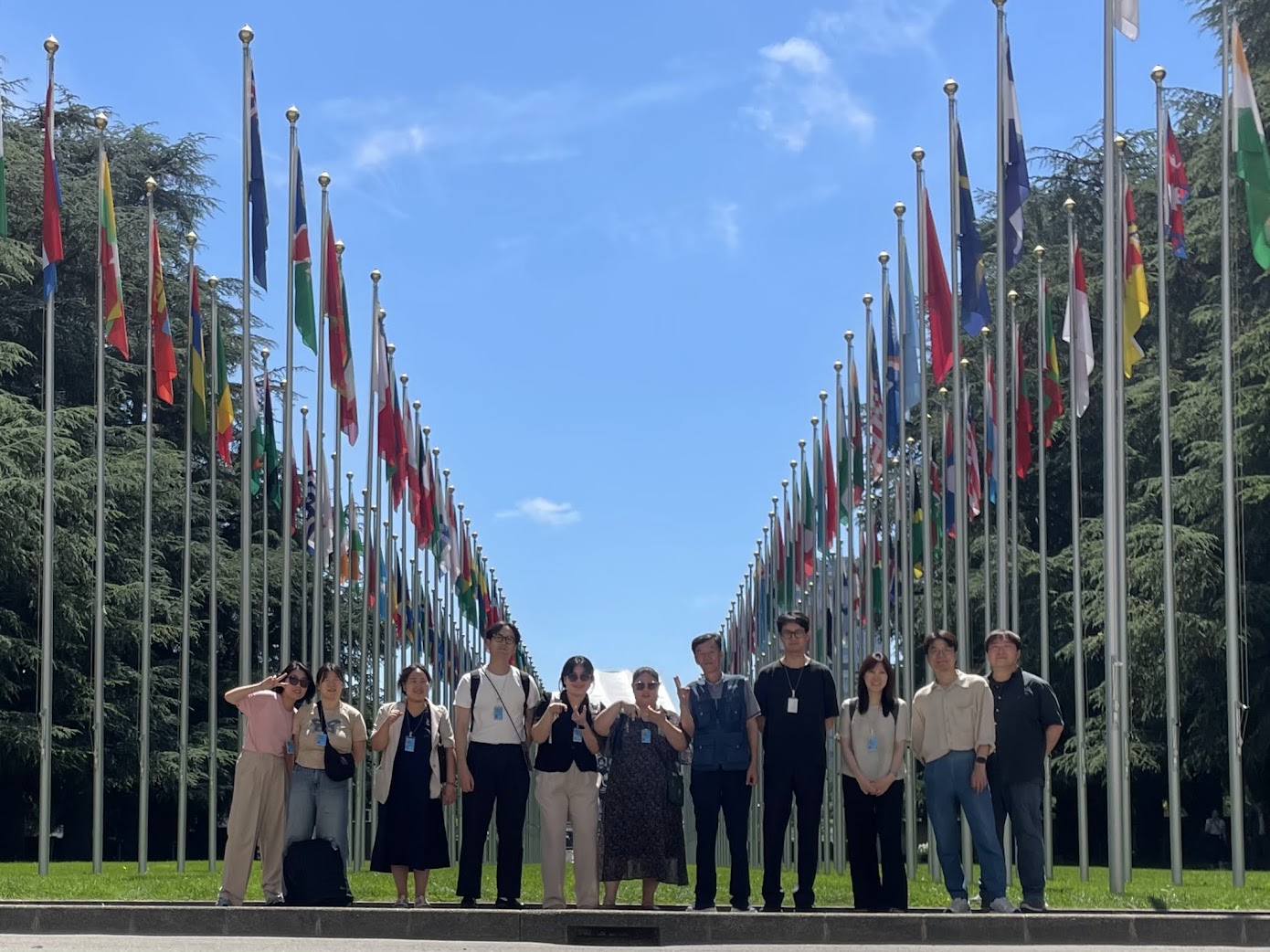
Photo: Korea Civil Society Coalition for the 6th CAT Committee review of ROK
KDF deeply appreciate the bravery of Kyung-In Park to testify her most painful memories at the UN CAT Committee. Do you want to see her amazing works in Geneva? Click and watch! (You can activate the English subtitles by clicking the Youtube cc button)

